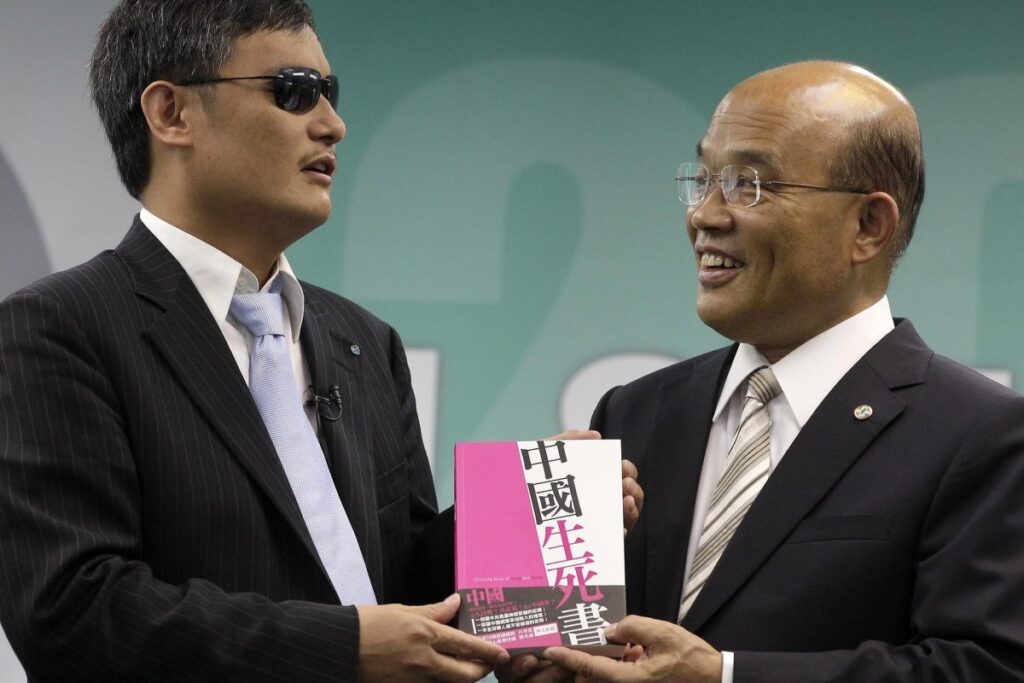In the dead of night on April 22, 2012, Chen Guangcheng, the blind Chinese activist known for his fight against forced abortions and sterilizations, made a daring escape from his extralegal house arrest in Dongshigu Village. For more than a year and a half, Chen had been confined to his home under tight surveillance by Chinese authorities. He had already endured years of imprisonment and brutal beatings by security forces. His attempts to communicate with the outside world were thwarted, and anyone who tried to visit him was met with violence.
On that moonless night, with his captors asleep, Chen made a desperate bid for freedom. He scaled the compound’s high walls, but his escape was nearly thwarted when he dropped into an adjacent yard, which was also under guard. Trapped, he waited for the neighbor to open the courtyard door before stealthily climbing onto the roof to hide. Once the neighbor went inside, Chen made his way down, continuing his journey toward freedom.
It was an arduous and dangerous escape. For the next 19 hours, Chen evaded dozens of guards and scaled multiple walls. During one of his falls, he broke three bones in his right foot. In excruciating pain, he crawled along the stony ground, freezing whenever he heard footsteps. He waited for the right moment—when the wind blew or guards were distracted by music on their phones—before continuing his crawl.
His escape led him to a critical rendezvous with He Peirong, a human rights advocate from Nanjing, who had previously faced beatings and robberies from the guards. Disguised as a courier, He entered the village, managing to safely transport Chen to Beijing, some 300 miles away, in her truck. He later became known as “Pearl” for her courageous act. He Peirong, who had been instrumental in spreading awareness of Chen’s plight, would face detention by the authorities for several days before her release.
Chen’s arrival in Beijing marked a turning point in his journey. He sought refuge at the U.S. Embassy, sparking an international diplomatic crisis. But the story of his escape—and those who helped him—reveals much more than a tale of individual bravery. It exposes the immense risks and relentless courage of those, like He Peirong, who defy a repressive state to fight for freedom and justice.
Before his escape, Chen was already well-known for his advocacy. In the 1990s, he had become a part of the growing “barefoot lawyer” movement, which sought to protect farmers and the disabled from the abuses of local officials. His work, which often brought him into conflict with the authorities, was rooted in his belief in justice and the rule of law, even in the face of immense personal risk.
While Chen was hiding in Beijing, He Peirong and others who assisted him became targets of intense surveillance and harassment by the authorities. They faced beatings, interrogations, and constant threats. The crackdown on activists attempting to help Chen was brutal—many were either detained or physically assaulted.
Despite his return to freedom, Chen’s fears were far from over. Authorities made it clear that his family’s safety was at risk, and even after being granted temporary refuge at the U.S. Embassy, Chen’s eventual exit from the facility was under great duress. As he recalled later, he felt immense pressure to leave the embassy after six tense days, even as he longed to stay in China to continue his activism.
Ultimately, Chen’s escape from Dongshigu and the efforts of those like He Peirong serve as a testament to the courage of individuals who are willing to risk everything for the cause of justice. They show how ordinary people, against all odds, can stand up to oppressive regimes and fight for the rights of those who cannot fight for themselves.
The story of Chen Guangcheng’s escape is one of resilience and defiance, a reckoning with the injustices that pervade Dongshigu Village, and the broader Chinese political system. The courage of those who helped Chen, like He Peirong, remains an inspiration to human rights activists worldwide, highlighting the dangers they face and the sacrifices they make in the fight for freedom and dignity.

